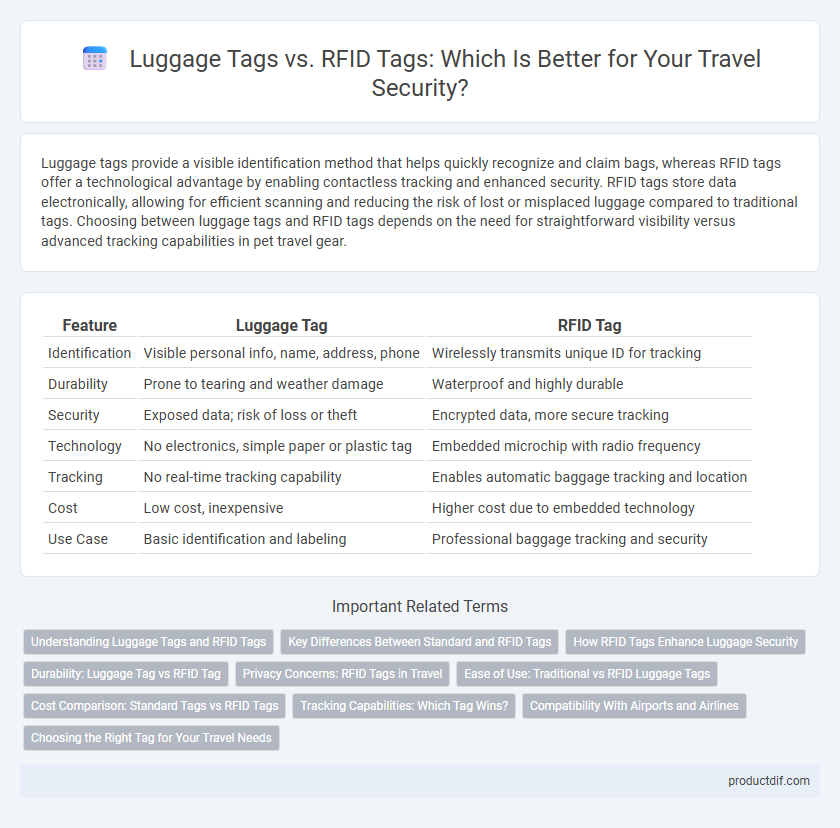Luggage tags provide a visible identification method that helps quickly recognize and claim bags, whereas RFID tags offer a technological advantage by enabling contactless tracking and enhanced security. RFID tags store data electronically, allowing for efficient scanning and reducing the risk of lost or misplaced luggage compared to traditional tags. Choosing between luggage tags and RFID tags depends on the need for straightforward visibility versus advanced tracking capabilities in pet travel gear.
Table of Comparison
| Feature | Luggage Tag | RFID Tag |
|---|---|---|
| Identification | Visible personal info, name, address, phone | Wirelessly transmits unique ID for tracking |
| Durability | Prone to tearing and weather damage | Waterproof and highly durable |
| Security | Exposed data; risk of loss or theft | Encrypted data, more secure tracking |
| Technology | No electronics, simple paper or plastic tag | Embedded microchip with radio frequency |
| Tracking | No real-time tracking capability | Enables automatic baggage tracking and location |
| Cost | Low cost, inexpensive | Higher cost due to embedded technology |
| Use Case | Basic identification and labeling | Professional baggage tracking and security |
Understanding Luggage Tags and RFID Tags
Luggage tags are traditional identification labels attached to bags, providing essential information such as name, address, and contact details to help travelers locate lost baggage. RFID tags, embedded with radio-frequency identification technology, offer advanced tracking capabilities by wirelessly transmitting unique data to airport systems for real-time baggage monitoring. Understanding the differences between standard luggage tags and RFID tags highlights enhanced security, efficiency, and faster retrieval in modern travel logistics.
Key Differences Between Standard and RFID Tags
Standard luggage tags are typically made of paper or plastic and display visible information like name and contact details, making them prone to damage or loss during travel. In contrast, RFID tags embed radio frequency identification chips that allow automatic wireless tracking and quick scanning at airport checkpoints, enhancing security and efficiency. RFID tags also provide real-time tracking and reduce the risk of misplaced luggage, unlike traditional tags that rely solely on manual inspection.
How RFID Tags Enhance Luggage Security
RFID tags enhance luggage security by enabling real-time tracking and rapid identification, significantly reducing the risk of lost or misplaced bags. Unlike traditional luggage tags, RFID tags use radio frequency technology to transmit unique identification data, allowing airports and travelers to monitor baggage throughout its journey. This technology improves security checkpoints and baggage handling processes by minimizing human error and unauthorized access.
Durability: Luggage Tag vs RFID Tag
Luggage tags made from durable materials like leather or heavy-duty plastic offer reliable resistance to wear and tear during travel, whereas RFID tags, often embedded in more flexible materials, provide durability with added electronic resilience to physical damage. RFID tags excel in maintaining functionality despite scratches or exposure to moisture thanks to their sealed electronic components. The enhanced durability of RFID tags extends beyond physical toughness by ensuring data integrity and consistent identification throughout rigorous handling.
Privacy Concerns: RFID Tags in Travel
RFID tags in travel luggage raise privacy concerns due to their ability to be scanned remotely, potentially exposing personal information without consent. Unlike traditional luggage tags, RFID tags emit signals that can be intercepted by unauthorized readers, increasing the risk of data theft or tracking. Travelers concerned about privacy should opt for RFID-blocking sleeves or opt for non-RFID luggage tags to safeguard their personal details.
Ease of Use: Traditional vs RFID Luggage Tags
Traditional luggage tags require manual entry of personal information and physical attachment, making them straightforward but prone to loss or damage. RFID luggage tags enhance ease of use by allowing quick scanning and automated tracking through embedded microchips, reducing the risk of misplacement. Travelers benefit from RFID tags' seamless integration with airport systems, streamlining baggage handling and improving overall travel efficiency.
Cost Comparison: Standard Tags vs RFID Tags
Standard luggage tags are significantly more cost-effective, typically priced under $1 per tag, making them ideal for budget-conscious travelers or bulk distribution. RFID tags, however, range from $5 to $10 each, reflecting advanced tracking technology that offers real-time luggage identification and enhanced security. Despite higher upfront costs, RFID tags reduce the risk of lost luggage and improve handling efficiency, potentially offsetting expenses in high-volume or frequent travel scenarios.
Tracking Capabilities: Which Tag Wins?
RFID tags provide superior tracking capabilities compared to traditional luggage tags by enabling real-time location updates and remote scanning without direct line-of-sight. Unlike standard luggage tags that rely on manual scanning and visible information, RFID systems use radio waves to automatically identify and track luggage across various checkpoints. This technology significantly reduces the risk of lost bags and improves efficiency in baggage handling at airports.
Compatibility With Airports and Airlines
Luggage tags are widely accepted by airports and airlines worldwide, offering easy identification and manual scanning, but lack advanced tracking capabilities. RFID tags provide seamless compatibility with modern airport systems, enabling automatic real-time tracking and reducing lost luggage incidents. Many major airlines and airports now support RFID technology for enhanced efficiency, though traditional luggage tags remain necessary for universal recognition.
Choosing the Right Tag for Your Travel Needs
Luggage tags provide clear visual identification, making it easier to spot bags, while RFID tags offer advanced tracking through radio frequency technology, enhancing security and real-time location updates. Selecting the right tag depends on your travel frequency, with RFID tags being ideal for frequent flyers who prioritize quick recovery and minimal loss risk. For occasional travelers, traditional luggage tags offer a cost-effective, straightforward solution without the need for electronic tracking.
Luggage Tag vs RFID Tag Infographic

 productdif.com
productdif.com